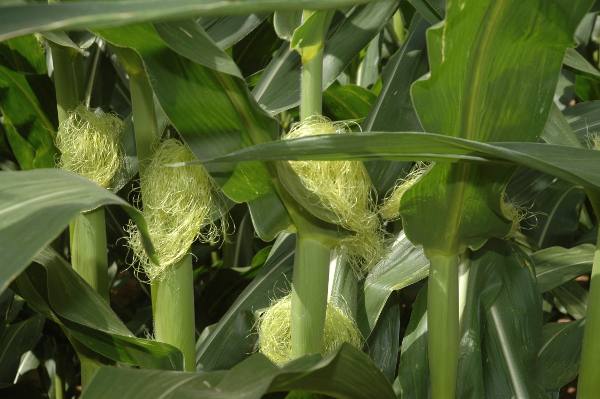July 17, 2013

Corn farmers from across Texas recently came to the Brazos Bottoms area of Texas, near College Station, to get a look at currently available and soon to be available DeKalb corn and sorghum hybrids at a Monsanto Advanced Farming Systems Showcase.
Participants in the field day also saw and sampled Seminis Sweet corn.
Doug Pustejovsky, Monsanto district sales manager, discussed DeKalb corn hybrids, especially new DroughtGard options. “DeKalb 63-55 will be one of four key DroughtGard hybrids for next year,” Pustejovsky said. The hybrid is a double-pro and will be available in a corn/cotton rotation. The other 90 percent of the DeKalb hybrids will offer a double-level of protection for both above-ground and below-ground insect pests. “If you have rootworm ground, three hybrids that are just as good to plant include 64-69, 67-57 and 62-08,” which offers a SmartStax package that provides multiple mode of action protection against corn earworm and corn rootworm. Genuity SmartStax Corn is an advanced all-in-one corn trait that provides above- and below-ground insect protection, plus herbicide tolerance.
“It’s a 112-day maturity that does well on dryland and irrigated acreage.” Pustejovsky said 62-08 has performed well in Blacklands soils.
New addition
A new addition for 2013 is Round-Up Ready 62-05, which comes from the same family background and works as a refuge option.
Seed supply of 65-80 will be limited next year. “We have the potential to have a little more of 66-40, which is a tall, aggressive corn plant with excellent drought resistence. It puts the ear high off the ground and has the potential to replace some standard products. We offer it mostly with the SmartStax package.”
DeKalb 66-87 is another tall plant that’s “a good fit for irrigation in areas like the Brazos Bottoms or more productive ground in the upper Gulf Coast.”
The third best hybrid in yield trials last year, 67-57, features new genetics with excellent grain quality. Also available is a Roundup Ready refuge hybrid, 67-55.
“Plant a mix of hybrids,” Pustejovsky said. “I believe our DeKalb line-up is as good as it’s ever been and the top four or five products are stronger than ever.”
Steve Carlson, territory agronomist for Monsanto, said population studies have shown increased yields with higher plant populations. Best management practices for soils and plants also make a difference, he said. “We know that 90 percent of yield potential depends on what goes on underground. Moisture management is a part of that equation, he said. “Most (farmers) in this area grow dryland corn, and irrigated acreage doesn’t always get enough water.”
That’s why Monsanto is developing DroughtGard hybrids, said Greg Steele, Monsanto technology development. “Moisture is our most limiting factor. Temperature is part of the equation, too.”
Peak water demand for a corn plant is during the pollination process, gradually tapering off through grain fill. Stress during that time may limit yield potential.
If you are enjoying reading this article, please check out Southwest Farm Press Daily and receive the latest news right to your inbox.
Steele said DroughtGard technology allows the corn plant to tolerate drought stress, “especially around grain pollination and grain fill. In hybrid trials, “we saw more than a 5-bushel per acre yield advantage with DroughtGard across all environments,” he said. DeKalb 63-55 is a DroughtGard hybrid available this year and 66-42 should be available in 2014 in limited quantities, Steele said.
Carlson showed differences in root structure and penetration on a “root dig” demonstration, where a trench exposed soil to a depth of 5 feet. “A deeper root system means more root mass,” he said. That root mass performs several crucial functions for the corn plant, including stability, nutrient uptake, water absorption and storage.
He said part of the DroughtGard advantage is a better, deeper root mass. “DroughtGard is one more tool corn farmers can use to manage moisture more efficiently,” he said.
Tommy Bertling, Monsanto district sales manager, discussed DeKalb sorghum hybrids and use of Headline fungicide to control disease pressure. “Does it pay? Last year there was a lot of foliar disease in sorghum, and trials conducted by BASF exhibited yield increases in some fields of more than 500 pounds per acre. We may not get that every year.”
He also recommended farmers look at available hybrids and match them to locations.
“Grain sorghum is an important crop in South Texas,” he said. “In some locations, it’s a better fit than corn.”
Lee Schill, Monsanto Vegetable Seeds Division, discussed Obsession II sweet corn, part of the Seminis Performance Series. Obsession II includes both above-ground and below-ground insect resistance and resistance to Roundup WeatherMAX and Roundup PowerMAX herbicides.
Field day participants got a chance to sample the product with the barbecue lunch.
You May Also Like




